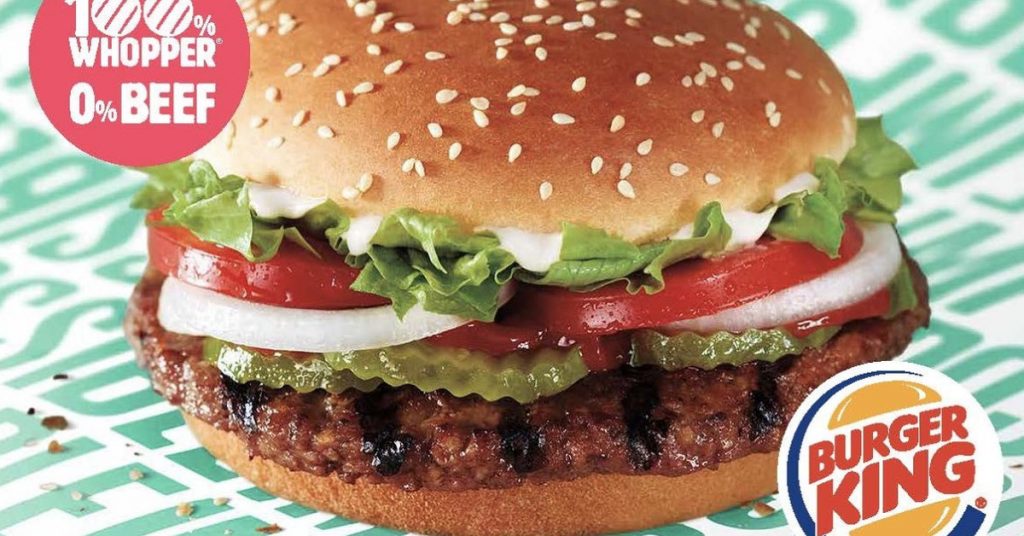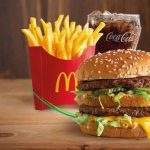The Impossible Burger patty in a Burger King Whopper is the biggest bang so far in the galaxy of plant-based meats, and now that bang is even bigger: The Impossible Whopper goes nationwide at all 7,200 Burger King locations in the US on Aug. 8, 2019.
After a successful test in St. Louis, which is battleground over the definition of “meat”, the Impossible Whopper spread to San Francisco, Las Vegas, Miami and other cities, but national rollout has always been the benchmark of a new era in fast food.
Nationwide availability of the Impossible Whopper does much to assuage concerns that plant-based patties are a fad, a concern cited as a reason that McDonalds hasn’t yet made a similar move.
When and if McDonald’s does choose (really, anoint) a plant-based “meat” patty it will be a bellwether, thanks to the brand having twice the number of locations and nearly four times the sales as Burger King in the US.
McDonald’s introduced a McVegan in Germany using a plant-based “Incredible Burger” from Nestle that has all the hallmarks of clear broadside at Impossible.
While the big food chains offer burgers, tacos, breakfast sandwiches and soon bacon made with plant-based meat, an even bigger battle is shaping up in grocery stores.
Impossible just cleared a major hurdle toward offering its plant-based meat in stores, thanks to a favorable FDA ruling over the safety of heme, the plant ingredient that allows the burger to “bleed.” Barring any objections that offer new proof the heme is unsafe, Impossible could have its burgers in grocery cases by this fall.
The road to the drive thru
Aside from a specially formed Impossible Burger patty that conforms precisely to Burger King’s bun diameter, the Impossible Whopper features the same bun, cheese and condiments as a traditional Whopper.
Long before national rollout, I got a jump on the new burger when I arrived at Impossible’s Silicon Valley headquarters carrying two bags of conventional Whoppers from the local Burger King.
There, J. Michael Melton, Impossible’s technical sales and culinary manager, cooked up a batch of the patties it’s supplying to Burger King, using the same broiler Burger King uses.
He swapped them in for the beef in the Whoppers (with professional dexterity that somehow left the burgers appealing) and I took a couple of bites.
The remarkable thing was how unremarkable they were: Nothing gives away the fact that this Whopper contains a different main ingredient.
When food is like a phone
Not unlike tech products, Impossible Burgers have updated versions. The patties supplied to Burger King are based on Impossible’s new 2.0 formulation that was announced at CES in January.
Among other upgrades, this formulation holds up better in restaurant environments, like sitting in hot holding trays or standing up to the 6-inch drop at the end of the conveyor that grills the patty for exactly 2 minutes, 35 seconds at 630 degrees Fahrenheit.We’re making meat from plants. That’s never been done before.Pat Brown, founder of Impossible Foods
“We’re making meat from plants. That’s never been done before,” Impossible Foods founder Pat Brown told me, tacitly demoting competitor Beyond Meat’s plant-based burger, which has been offered at most of the 1,100 Carl’s Jr. restaurants since the beginning of 2019.
“People have made plant-based replacements for meat, but they haven’t made plant-based meat.”
One way the Impossible Whopper will indeed differ from the original is price, costing a significant $1 more in an industry where brands have gone to war brandishing menus of items that only cost a dollar. As with electric cars, price parity with the established choice is a future linchpin to mainstream success.
“Once we have products that taste the same or better and that cost less, plant-based and clean meat will simply take over,” according to Bruce Friedrich, executive director of the Good Food Institute, which champions plant- and cell-based meats.
“So very little will change in people’s everyday lives as more and more meat is produced either from plants or from cells. Consumers will continue to buy burgers, chicken sandwiches and sausages, [but] those products will simply not have the adverse impact on our environment and global health.”
The plant meat wars are just starting
Burger King doesn’t break out sales figures for Whoppers, let alone its expectations for the more expensive Impossible Whopper, but some insights can be inferred from a 2018 survey by Faunalytics.
Assuming price was no different between beef and alternative burgers, 65% of consumers polled said they’d still stick with beef, 21% would choose a plant-based burger like Impossible, and 11% would select a cultured burger grown from animal cells, which isn’t expected on the market until the early 2020s.
But Impossible’s Pat Brown feels such surveys leave out the qualitative experience. “If you give them our burger, and then ask them the question again, a very large majority of them say they would definitely buy it and would be willing to pay a premium for it.”
Acceptance of plant-based meats turns not only on taste, texture and price but on overcoming momentum. Environmental and animal welfare arguments have triggered a million conversations and social media posts about meat’s issues, yet US per capita meat consumption hit an all-time high in 2018.
A recent consumer survey also found that concern for personal health handily trumped concern about the environment and animals as a driver of plant-based meat choice.
“We need to change the meat, because we aren’t going to change human nature,” Friedrich said in a recent New York Times profile.
That Burger King started its rollout of plant-based meat in Missouri is bold, given that Missouri is the first state to make it a crime to use the word “meat” to label a product that “is not derived from harvested production livestock or poultry,” with up to a $1,000 fine and a year in prison.
But a trial launch in cannabis-, quinoa- and kale-saturated California might have been seen to prove little about the Impossible Burgers’s mainstream appeal.
And while burgers are the American diet icon, steaks aren’t far behind, and an even bigger challenge in alternative meat marketing may soon unfold at fast casual steak chains like Outback or Texas Roadhouse.
Unlike burgers, steaks generally arrive on the plate unadorned, without bun, cheese or condiments to mask any shortcomings. Get steak right, so the thinking goes, and the plant-based dominoes begin to fall.
Impossible’s Brown says burger R&D has prepared it for the challenge. “I can say, with complete confidence, that we’re going to nail it and not only make a great steak, but we’re going to make a steak that’s as good as anything that ever fell out of a cow.”
source: http://www.cnet.com
MARKETING Magazine is not responsible for the content of external sites.









